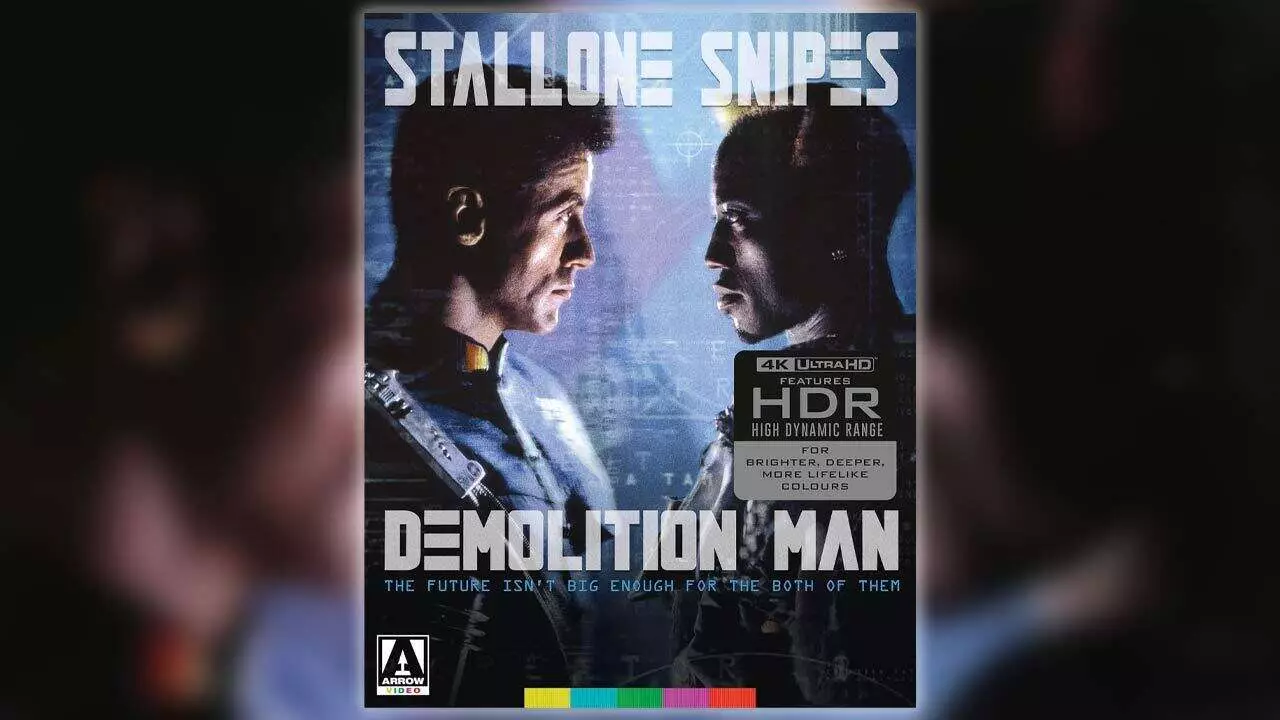“Demolition Man,” released in 1993, is more than just an action film; it’s a lens into the evolution of societal norms, pop culture, and cinema during the ’90s. Blending elements of satire, action, and science fiction, the film has amassed a cult following that continues to inspire discussions today. As Arrow Video prepares for the release of its meticulously restored 4K Blu-ray edition on December 17, this moment ushers in a renewed interest in a film that, despite its initial reception, transcended the confines of its era. Exploring the film’s themes and its upcoming home release can illuminate why “Demolition Man” remains relevant more than three decades later.
Pre-ordering the limited edition Blu-ray for $37.43, a significant discount from its retail price of $60, serves as an enticing proposition for collectors and fans alike. This special release features several unique elements designed to enhance the viewing experience. The oversized box packing includes a 60-page collector’s book rife with freshly penned critiques by film experts, which provides a contemporary analysis of the film’s legacy. Additionally, collectible art postcards and a double-sided poster featuring new artwork by Laurie Greasley add a tangible connection to the film’s aesthetic.
One particular quirk of this release is its inclusion of both the Taco Bell and Pizza Hut cuts of the film. The original U.S. version portrayed Taco Bell as the singular culinary survivor of the fictional “Franchise Wars,” while international audiences had a taste of Pizza Hut. This alteration speaks volumes about the global marketplace’s influence on media during the ’90s and how such corporate efforts shaped viewers’ perceptions of the film’s world.
Beyond the physical collectibles, the 4K restoration of “Demolition Man” promises to elevate the cinematic experience. Enhanced clarity and audio are set to redefine how audiences experience the story of John Spartan and Simon Phoenix. The restoration was meticulously overseen by director Marco Brambilla, ensuring that the essence of the film has been preserved while also maximizing its visual fidelity.
For fans yearning for a deeper understanding, this release includes a plethora of special features that bridge the gap between nostalgia and modern storytelling. New audio commentary tracks featuring Brambilla alongside screenwriter Daniel Waters provide insight into the creative choices that shaped the film. Interviews with various contributors, including production designer David L. Snyder and makeup effects artist Chris Biggs, invite viewers behind the curtain, shedding light on practical effects and design in a pre-CGI world. Notably, the documentary “Somewhere Over the Rambo” offers further exploration, reinforcing the film’s satirical commentary on both society and the action genre.
At its core, “Demolition Man” proposes a dichotomy between chaotic, liberty-driven past and an overly controlled, sanitized future. John Spartan, played ingeniously by Sylvester Stallone, is the embodiment of raw masculinity struggling against a utopian society that frowns upon his antics. Wesley Snipes, as Simon Phoenix, serves as both antagonist and mirror, inviting audiences to contemplate what happens when liberation clashes with authoritarian ideals.
The film’s humorous yet critical portrayal of modern society’s over-reliance on technology and regulation resonates more than ever today. Issues of freedom, individuality, and societal control are particularly poignant in the context of contemporary global events, making “Demolition Man” a film that invites ongoing discourse.
As the countdown begins for the 4K Limited Edition release of “Demolition Man,” it is clear that this action film remains an underappreciated gem. The combination of enhanced visuals, intriguing special features, and collectible items makes this release a must-have for fans and newcomers alike. Not only does it celebrate the film’s legacy, but it also potentially enriches our understanding of cinematic art and societal commentary. As we revisit the absurdity of the “Franchise Wars” and the enigmatic three seashells, it is essential to appreciate how this cultural artifact from the ’90s continues to engage and provoke thought in 21st-century viewers.


Leave a Reply